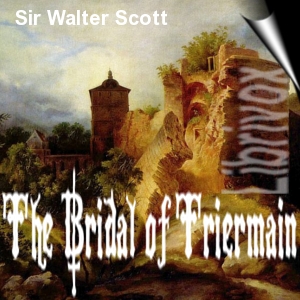
Scott’s The Bridal of Triermain is a rhymed, romantic, narrative poem which weaves together elements of popular English legend using dramatic themes.
This beautiful poem celebrates the exploits of a knight errant – Sir Roland De Vaux – as he seeks to rescue (and hopefully espouse) a beautiful maiden, Gyneth. Gyneth is the illegitimate daughter of King Arthur: doomed by Merlin 500 years previously to an enchanted sleep inside a magic castle. The enchantment can only be broken by a rescuer both brave and noble enough to overcome the temptations used successively to distract and overcome him, namely: fear, wealth, pleasure and pride.
(Introduction by Godsend)

Other Audiobook
Audiobook: Celebrated Crimes
Dumas’s ‘Celebrated Crimes’ was not written for children. The novelist has spared no language —
Audiobook: Velasco
Inspired by the tale of El Cid, U.S. author Epes Sargent created this drama about
Audiobook: Clayhanger (Version 2)
A coming-of-age story about Edwin Clayhanger, who leaves school, has his ambition to become an
Audiobook: Other Side of the Door
It’s 1865 in the city of San Francisco. Pretty, young Ellie Fenwick is walking to
Audiobook: Fifty Funny Animal Tales
“This book contains short stories of animals that will charm the children. Such characters as
Audiobook: Dedications
Dedications is an anthology of the forms used from the earliest days of book-making to
Audiobook: Magic of Oz (version 2)
This is the second to last book in the OZ series that Baum actually wrote
Audiobook: A Midsummer Night’s Dream
Summer nights, romance, music, comedy, pairs of lovers who have yet to confess their feelings
Audiobook: Mrs. Bindle
Herbert Jenkins’ most popular fictional creation was Mr. Joseph Bindle, who first appeared in a
Audiobook: Ranchman
A fast-paced old time western. Squint Taylor, a rancher and long time resident of Dawes,
Audiobook: Sweethearts
Sweethearts is a comic play billed as a “dramatic contrast” in two acts by W.
Audiobook: Divine Comedy
The Divine Comedy (Italian: Commedia, later christened “Divina” by Giovanni Boccaccio), written by Dante Alighieri